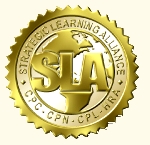
Benefits: Why is Credentialing important?
According to the Society of Human Resource Management (SHRM, 2010/12) over 90% of new-hires and promotions are based on an individual employ holding certification. This results from a desire in the hiring community to ensure that new-hires or promoted employees demonstrate an ability to understand best practices (theoretic) for improved performance within a given profession. To this end, a recent phenomenon has occurred whereby the traditional pathway to higher-education is changing, and learners are now investing has much time in professional roles while also involved with degree programs (Pink, 2013). As a result, there are increased demands to not only ensure academic development of individuals as working professionals, but also measure their applied performance so that they may grow professionally while pursing degree’s over longer-term periods (Rand, 2013). Furthermore, according to the Seattle Jobs Initiative, 83% of Human Resource professionals indicate the performance skills (goal-setting, communication, team-work, self-awareness, proactivity) are the primary challenge faced when new hires are made within an organization (SJI, 2013).
Professions by definition, require an association of members to be recognized as a professional role; furthermore, a professional must have a standard of best practices and seek to improve the collective participation of a body of members within a given profession by creating standards. With rising groups within private, non-profit, and civil defense agencies interacting with negotiation client, vender, and internal strategies to improve culture, reduce costs, or create win-win agreements to avoid layoffs or other fiscally required alterations due to the economy, a clear need has been presented to the SLA to confer a certification for those who demonstrate the capabilities meeting the rigors of the SLA examination process.
As a result, using the SLA credentialing process and requisite subject-matter expert advisory committee, academic and applied performance standards have been created to measure best-practice (theory) and application (experience and results) to create the Certified Professional Negotiator (CPN). This certification, along with the Certified Professional Coach (CPC) , Human Resource Associate (HRA), and Certified Professional Leader (CPL) are administered by the SLA. Over 7000 people will hold credentials through the SLA through year-end 2018. Join the ranks of growing learning-based professionals to demonstrate your professional competencies.
